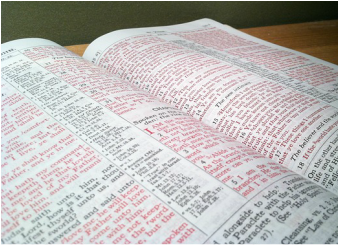|
In today's lesson, God turns His attention to the rulers of Judah. Jeremiah Chapter 23 Lessons from the textVerse by Verse CommentaryThe Long Hand of Sin While idolatry in the northern kingdom began with its first king, a foreign God was not worshiped by the Jews until Ahab and Jezebel. They fully worshipped Baal, building him a temple and caring out all the rituals of that religion (I Ki. 16:31-32). They even had several hundreds priest for Baal (I Ki. 18:19). The same sin entered into the southern kingdom when Jehoram took Jezebel’s daughter to wife (II Chro. 21:6). Ever since then, both nations have been plagued with believers of this false god, pulling the people away from the truth of the living God. In effect, because of one man’s sin of marrying a wicked woman, two nations have been under the judgment of God for centuries. Whatever sin you commit can have far wider-reaching consequences than you could ever imagine.  1 Chapter 22 deals with the kings of Judah. Now, God turns His attention to the other rulers of the nation. 2 The rulers have been failing their duties of gathering and protecting the people. God ordains authorities to enact justice, provide for the poor, and defend against invading forces (Deut. 16:18-20). Instead, they have done the opposite by scattering the people. God will respond by returning equal treatment on the rulers; since they have scattered the people, God will scatter them in a foreign land (Jer. 9:16). 3 In lieu of the human authorities, God Himself will gather and protect His flock. Under His care, the people will flourish in their labors and numbers. On Israel being God’s flock, see Isaiah 40:10-11, Isaiah 53:6, and Psalm 23:1. 4 God will raise up new leaders who will perform His will. If those who God has appointed refuse to fulfill their duties, God will remove them and replace them with those who are obedient. Consider the story of Saul and David; because Saul refused to obey God’s commands, God took his kingdom away from him and raised up David as king (I Sam. 15:26-28). 5-6 The capitalization of the words “Branch” and “King” indicates deity. As this person will deliver Israel and be called “THE LORD,” it is clear that this person is the incarnated God. As Isaiah 7:14 reveals, the Jews have been given the revelation that the Son of God is coming in human form to deliver humanity. The “Branch of David” means that the Messiah will be a descendent of King David, and thus a rightful heir by human standards to the throne in Jerusalem. This King will do what the human leaders have failed to do; namely, to execute righteous judgment on the earth. 7-8 This repeats almost verbatim the prophecy of Jeremiah 14:16. 9-11 Having addressed the king and the chief rulers, Jeremiah now addresses the religious leaders. The prophets have led the people so astray into sin that it has broken Jeremiah’s and God’s hearts. The analogy of drunkenness is to evoke the image of staggering around aimlessly; the effects of the false teaching of the prophets has rattled Jeremiah so strongly that he is left dumbfounded and staggering. On the sins of the priests in the temple, see Ezekiel 8:7-11. 12 As punishment for their sins, the priests and prophets will continue to pursue their ways until it destroys them. God will reward evil doers with righteous judgment. 13 Since Ahab and Jezebel, the false god Baal has been an idol worshiped in the Northern Kingdom (I Ki. 16:31-32). The prophets of Baal teach the people to turn from God and commit spiritual adultery with this pagan god. 14 The prophets of Judah are also guilty of leading the people into spiritual adultery. In addition to the fleshly sins of Sodomy, the inhabitants of these two cities had waxed bold in their sin. The priests of Jeremiah’s days, like the people of Sodom and Gomorrah, have lost all fear of God and shame over their sins (Jer. 8:12, Isa. 3:9). 15 Both gall and wormwood are extremely bitter. For prophesying false words, God will fill them with bitterness. See Jeremiah 9:15. 16 God openly rebukes the false prophets. God is the one who searches the heart (Jer. 17:10). He knows who is speaking God’s words and who is speaking from their own heart. Such is why He is able to openly rebuke certain teachers and preachers. Humans, on the other hand, can only judge the validity of a man of God by looking for evidences of the anointing of the Holy Spirit in that person’s life (Mt. 7:15-16, Gal. 5:22-23). 17-18 The people have chosen to believe the false prophets are the true prophets because they speak what the people wish to hear. The sinner wishes to hear that he can continue to live as he pleases without any consequences. They are too filled with lust for their own ways to harken to the true voice of God. 19-25 Choosing false prophets over God’s word, the wicked have incurred the wrath of God. These prophets have taken the liberty to send themselves; rather than seeking God’s calling for their lives, they have declared their own anointing and behaved as if God has called them to prophesy. Even so, if they had taken the office of prophet falsely yet still taught the people the true words of God, then God would have used them to remove evil from the people. Unfortunately, they have not done so. Therefore, God reminds the people and prophets that He is nearby, always seeing and hearing what man is doing. The wicked believe they can live as they please because they believe that God cannot see them (Ps. 94:7). They falsely believe that God is far removed from human affairs and therefore will be satisfied with some prayers and sacrifices instead of the actual requirement of God’s approval which is faith and obedience. 26-27 Being a God close at hand, God sees all the wickedness of the prophets and wonders how long will this idolatry with Baal continue. 28-29 God draws a comparison between His words and the prophets' words. The man-made words are like chaff, lightweight and useless. God's words, however, are like wheat which is delicious and sustaining. God's words are also like the fire which burns up everything it touches and the hammer which has the strength to break that which has been hardened. Even if one has built a solid foundation on one's own accord, God's word can break it up. 30-32 The false prophets are here accused of three things: taking away God's words from the hearts of the people, giving the people new words on the pretense that they came from the Lord, and sharing prophetic visions that are not of God. It is a dangerous thing to share a vision, dream, or word unless one knows with absolute certainty that is truly of God. 33-40 Even though the priests have taught falsely and the prophets have prophesied falsely, the people are also to blame. God says that everyone has perverted His words. God commanded that parents teach their children all the laws of Moses and the words of the prophets. If this commandment had been fulfilled, then the people would have able to recognize false teachings and thus been able to rebuke the priests and prophets for straying away from God's Commandments. Since the people themselves have chosen to accept the lies rather than seek out the truth of God's word, God will no longer deal with them but instead will give them their desire of allowing them to make up their own prophecies. The judgment against the false prophets goes even further. Since they have actively altered and added to the commandments of God to lead people astray, God will bring an everlasting repproach upon them. ___________________ Thank you for your faithfulness in studying God’s word. Please comment below to share what you learned from today's lesson.
0 Comments
Leave a Reply. |
Devotional Categories
All
Archives
September 2023
|
|
Join my mailing list!
|
Thank you!You have successfully joined our subscriber list. |
|
© 2024 Melissa Beaty
|
